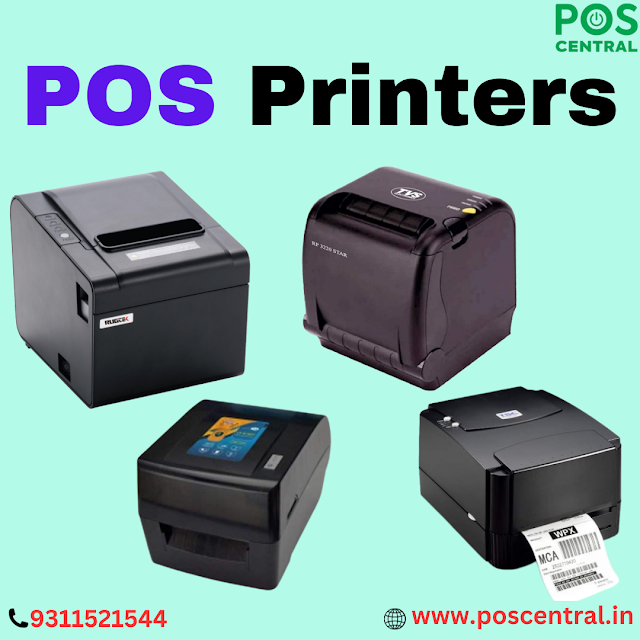Why POS Printers Are a Smart Investment for Your Business
In today’s fast-paced business environment, efficiency and accuracy are paramount. Point-of-sale (POS) printers have become an integral part of modern businesses, offering a streamlined approach to transaction processing. These devices are not just about printing receipts; they are about enhancing the overall operational efficiency of a business. As businesses grow and evolve, the need for efficient transaction processing systems has never been more critical. POS printers play a vital role in meeting this demand, ensuring that transactions are quick, accurate, and seamlessly integrated with other business operations.
We will explore how these devices can enhance your business's efficiency, accuracy, and overall profitability, making them a smart investment for any enterprise.
Enhanced Efficiency and Accuracy in Transactions
Speed and Convenience: How POS Printers Streamline the Checkout Process
One of the primary benefits of a POS printer is its ability to significantly speed up the checkout process. In retail and hospitality environments, where every second counts, the quick processing capabilities of POS printers can make a substantial difference. By efficiently printing receipts and processing transactions, these devices reduce wait times, thereby improving customer satisfaction. A faster checkout process not only keeps customers happy but also allows businesses to serve more customers in less time, ultimately boosting sales.
Error Reduction: The Role of POS Printers in Minimizing Human Errors
Manual entry of transaction details can often lead to errors, which can result in customer dissatisfaction and loss of revenue. They help mitigate this risk by automating the receipt generation process. By reducing the need for manual input, these printers minimize the chances of errors in billing and transaction records. This accuracy is crucial in maintaining customer trust and ensuring that your business operates smoothly without discrepancies in financial records.
Integration with Inventory Management: Syncing with Real-Time Stock Updates
Another significant advantage of printers for sale is their ability to integrate seamlessly with inventory management systems. This integration ensures that every transaction is automatically recorded, allowing for real-time updates to inventory levels. Such synchronization helps prevent over-selling, as the system will notify you when stock levels are low or when a product is out of stock. This real-time data is invaluable for maintaining accurate inventory records, planning restocks, and making informed business decisions.
Cost-Effectiveness and Long-Term Savings
Initial Investment vs. Long-Term Benefits: The Cost-Effectiveness of POS Printers
While the initial investment in them may seem significant, the long-term benefits far outweigh the costs. They are designed to be durable and reliable, ensuring they can handle the demands of a busy business environment. Over time, the increased efficiency and accuracy they provide lead to substantial savings by reducing waste, minimizing errors, and improving overall operational efficiency. The return on investment (ROI) from POS printers is seen in the form of reduced transaction times, fewer errors, and enhanced customer satisfaction, all of which contribute to higher profits.
Reduced Maintenance Costs: Durability and Low Maintenance Requirements
Modern point of sale printer is built to last, with robust designs that require minimal maintenance. Unlike other office equipment that may require frequent repairs or replacements, they are generally low-maintenance, reducing the overall cost of ownership. Their reliability ensures that your business operations are not interrupted by technical issues, allowing you to maintain a smooth and efficient workflow. The long lifespan and minimal upkeep of POS printers make them a cost-effective choice for businesses looking to optimize their resources.
Improved Customer Experience Leading to Increased Sales
A key aspect of any business is providing a positive customer experience, and point-of-sale printers contribute significantly to this goal. A smooth and efficient checkout process leaves a lasting impression on customers, encouraging repeat business and fostering loyalty. When customers have a seamless experience, they are more likely to return and recommend your business to others. This improved customer experience, driven by the efficiency and accuracy of POS printers, can lead to increased sales and growth for your business.
Investing in a POS printer is not just about acquiring a piece of hardware; it’s about making a strategic decision that will enhance your business's efficiency, accuracy, and profitability. From speeding up transactions to reducing errors and integrating with inventory management, they offer numerous benefits that make them a smart investment for any business.
Buy printer online as they are a valuable asset that can drive long-term success for your business. By improving operational efficiency, reducing costs, and enhancing the customer experience, they play a crucial role in helping your business grow. If you’re looking to invest in technology that offers tangible benefits and a high return on investment, consider adding a POS printer to your business toolkit today.














.png)